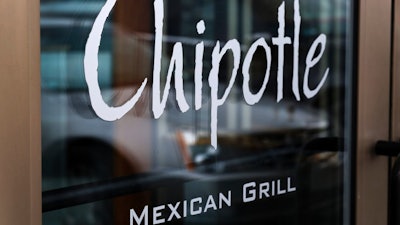
 Chipotle says it has completed phasing out genetically modified ingredients from its food.
Chipotle says it has completed phasing out genetically modified ingredients from its food.
The Denver-based chain had already been using mostly non-GMO ingredients, but was working on changing a tortilla.
Most of the country's corn and soybean crops are genetically modified to have certain traits like resistance to herbicides and plant diseases, and the Food and Drug Administration has maintained that GMOs are safe.
In recent years, however, activists have been calling for regulations that require labeling for foods that contain genetically modified ingredients. Many companies have already responded to such concerns. Whole Foods has said all products in its stores that contain genetically modified ingredient will be labeled as such by 2018.
Chipotle Co-CEO Steve Ells has said the company felt it was best not to use GMOs given the "lack of consensus" about their effects. On its website Monday, Chipotle said it was "G-M-Over It."
Chipotle Mexican Grill, which has around 1,800 locations, has enjoyed strong sales growth in recent years in part by positioning itself as a more wholesome alternative to traditional fast-food chains. The chain said it was the first national restaurant chain to disclose the presence of GMOs in its ingredients in 2013.
Then in January, it said it would stop serving pork in about a third of its restaurants after finding one of its suppliers violated its animal welfare standards. The company said it doesn't expect the pork shortage to be fully resolved until late this year.
Chipotle still serves Coca-Cola fountain drinks, which are made with high-fructose corn syrup. But this past summer, Chipotle started testing a root beer that is organically sweetened in Denver. That test is ongoing, said Chris Arnold, a company spokesman.
Chief Financial Officer Jack Hartung said in October 2013 that the company was starting to see higher oil costs as it converted from GMO soybean oil to non-GMO sunflower and rice bran oil. Hartung said at the time the higher costs might be reflected in an eventual price increase, but that it would be a "pretty exciting time" when the company announced its transition was complete.
The completion of the phase-out was first reported by The New York Times.






















